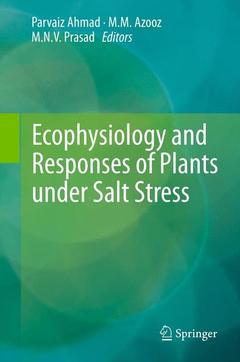Description
Ecophysiology and Responses of Plants under Salt Stress, 2013
Coordinators: Ahmad Parvaiz, Azooz M.M., Prasad M.N.V.
Language: English
Subjects for Ecophysiology and Responses of Plants under Salt Stress:
Keywords
512 p. · 15.5x23.5 cm · Paperback
512 p. · 15.5x23.5 cm · Paperback
Description
/li>Contents
/li>Biography
/li>Comment
/li>
Dr. Parvaiz Ahmad (Editor)
Dr. Parvaiz is Assistant professor in Botany at A.S. College, Srinagar, Jammu and Kashmir, India. He has completed his post-graduation in Botany in 2000 from Jamia Hamdard New Delhi India. After his Ph.D from Indian Institute of Technology (IIT) Delhi, India in 2007 he joined International Centre for Genetic Engineering and Biotechnology, New Delhi, India. His main research area is stress physiology and molecular biology. He has published more than 30 research papers in peer reviewed journals and 16 book chapters. He has also edited three volume 2 with Springer NY USA and 1 with Studium Press Pvt. India Ltd., New Delhi, India. He have received Junior Research Fellowship and Senior Research Fellowship by CSIR, New Delhi, India, during his Ph.D. Dr. Parvaiz has been awarded Young Scientist Award under Fast Track scheme in 2007, by Department of Science and Technology, Govt. of India, New Delhi, India. Dr. parvaiz is actively engaged in studying the molecular and physio-biochemical responses of different agricultural and horticultural plants under environmental stress.
Prof. Mohamed M. Azooz (Co-editor)
Pro.Dr. M.M. Azooz is a Professor of Plant Physiology in department of Botany, Faculty of Science, South Valley University, Qena, Egypt. He received the B.Sc in 1984 and M. Sc. in 1990 from Assiut University, Egypt; and Ph.D in 1997 from South Valley University, Qena, Egypt in collaboration with Tübingen University, Germany. He has published more than 70 research articles in peer reviewed journals and 5 book chapters in international books. He has supervised many M.Sc. students and Ph.D. scholars till date and many are in progress. He is a member of editorial board and reviewer of many international journals. Prof. Azooz has been included in Marquis Who’s in the World (Biography, 28th Edition, 2011), and in the “Top 100 Scientists” list, International BiographicalCentre, Cambridge




